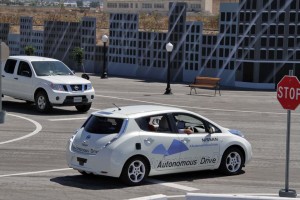
A prototype Nissan Leaf autonomous vehicle negotiates a simulated urban intersection, complete with cross traffic.
The auto industry’s interest in autonomous vehicles has moved into high gear and an expert, who has studied both the technology required for self-driving cars and the challenges they face, is now predicting the first models will reach the road by the end of the decade.
Mark Campbell, a Cornell University professor of mechanical and aerospace engineering who leads a research group that studies and builds autonomous systems, including vehicles, is predicting autonomous cars will reach the market sooner rather than later.
“I have to admit that I did not think mass production was doable by 2020, but I am beginning to change my mind. The power of Google in this arena has been tremendous, as Google takes an approach that is more research-driven, cutting edge and riskier than the car companies,” Campbell said.
“I would imagine that the starting points are places with longer car commutes and laws that have been tackled, like California, whereas places like New York City will be harder because GPS coverage is more challenging with the tall buildings.”
Campbell was responding to comments from Tesla Motors’ announcement that it is in the process of developing a car capable of driving itself. Tesla founder Elon Musk, who has reshaped attitudes on new technology breakthroughs within the auto industry, is now predicting robot cars that can take over most of the driving from their human handlers will be ready for the road within three years.
(Click Here for more on Tesla’s autonomous driving program.)
Tesla is now actively recruiting engineers to help bring Musk’s prediction to life, according to The Financial Times.
And while Musk cautioned Tesla will likely only produce a “90% autonomous” vehicle, leaving driving duties to human operators on more challenging roads, Nissan Motor Co. last month announced plans to bring out a fully functional and “affordable” autonomous vehicle in 2020.
(Click Here for more on Nissan’s plans to launch an autonomous vehicle.)
Other carmakers are also stepping up efforts to develop the technology required to make autonomous vehicles more feasible. Mercedes-Benz showed off its new Intelligent Drive system during the Frankfurt Motor Show media days this month. And states such as California, Nevada and Michigan already have or soon plan to revise their laws to allow experiments with autonomous vehicles on public roads.
Even before the first autonomous vehicles go into production, the technology required for self-driving cars is showing up in driver assistance packages that are now widely available on vehicles ranging from the Subaru Legacy to the new Mercedes S-Class.
Features such as blind spot detection and lane departures warnings, which have become more common on vehicles of all sorts in the past three years, are considered building blocks for autonomous vehicles, which originally seemed hemmed in by legal and regulatory requirements.
Dieter Zetsche, the chief executive officer at Daimler AG, has said that the technology behind autonomous vehicles has the potential to save thousands of lives by helping drivers avoid accidents.
Mercedes-Benz, for example, now offers a sophisticated driver assistance package on its S-Class and E-Class models that allows the vehicle to drive itself under certain conditions. The new 2014 Infiniti Q50 introduces a lane following technology and a new steer-by-wire system.
(Automakers “democratize” technology, offering luxury-level hi-tech features in mainstream models. Click Here for more.)
Cars from brands such as Infiniti, Toyota, Lexus, Audi and Mazda are being equipped with automated braking system that will take over from an inattentive driver under emergency conditions and adaptive cruise controls that will modulate a vehicles speed on the highway, depending on traffic and road conditions.
Carmakers and key suppliers, such as Continental, also are experimenting and in many cases equipping cars with cameras, radar, lasers and sensors to help guide the vehicle under all sorts of conditions. The rapid drop in the price of the technology should help make autonomous vehicles not only feasible, experts like Cornell’s Campbell say, but also more affordable.

Now when incompetent people crash their car they will claim it was the car not them…